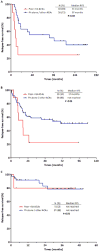Poor outcomes associated with +der(22)t(9;22) and -9/9p in patients with Philadelphia chromosome-positive acute lymphoblastic leukemia receiving chemotherapy plus a tyrosine kinase inhibitor
- PMID: 28006851
- PMCID: PMC5495018
- DOI: 10.1002/ajh.24625
Poor outcomes associated with +der(22)t(9;22) and -9/9p in patients with Philadelphia chromosome-positive acute lymphoblastic leukemia receiving chemotherapy plus a tyrosine kinase inhibitor
Abstract
In patients with Philadelphia chromosome-positive (Ph+) acute lymphoblastic leukemia (ALL) treated with chemotherapy plus a tyrosine kinase inhibitor (TKI), the prognostic impact of additional chromosomal abnormalities (ACAs) is not well-established. We evaluated the prognostic impact of individual ACAs in 152 patients with Ph+ ALL receiving first-line intensive chemotherapy plus either imatinib (n = 36), dasatinib (n = 74), or ponatinib (n = 42). ACAs were identified in 118 patients (78%). Compared to outcomes of patients without ACAs, ACAs were not associated with differences in either relapse-free survival (RFS; P = 0.42) or overall survival (OS; P = 0.51). When individual ACAs were evaluated, +der(22)t(9;22) and/or -9/9p in the absence of high hyperdiploidy (HeH) was present in 16% of patients and constituted a poor-risk ACA group. Patients with one or more poor-risk ACAs in the absence of HeH had significantly shorter RFS (5-year RFS rate 33% versus 59%, P = 0.01) and OS (5-year OS rate 24% versus 63%, P = 0.003). Poor-risk ACAs were prognostic in patients who received imatinib and dasatinib but not in those who received ponatinib. By multivariate analysis, this poor-risk ACA group was independently associated with worse RFS (HR 2.03 [95% CI 1.08-3.30], P = 0.03) and OS (HR 2.02 [95% CI 1.10-3.71], P = 0.02). Patients with Ph+ ALL who have +der(22)t(9;22) and/or -9/9p in the absence of HeH have relatively poor outcomes when treated with chemotherapy plus a TKI.
© 2016 Wiley Periodicals, Inc.
Figures


Similar articles
-
Correlation between deletion of the CDKN2 gene and tyrosine kinase inhibitor resistance in adult Philadelphia chromosome-positive acute lymphoblastic leukemia.J Hematol Oncol. 2016 Apr 18;9:40. doi: 10.1186/s13045-016-0270-5. J Hematol Oncol. 2016. PMID: 27090891 Free PMC article.
-
Additional Cytogenetic Abnormalities with Philadelphia Chromosome-Positive Acute Lymphoblastic Leukemia on Allogeneic Stem Cell Transplantation in the Tyrosine Kinase Inhibitor Era.Biol Blood Marrow Transplant. 2018 Oct;24(10):2009-2016. doi: 10.1016/j.bbmt.2018.06.006. Epub 2018 Jun 14. Biol Blood Marrow Transplant. 2018. PMID: 29908230 Clinical Trial.
-
Hyper-CVAD plus ponatinib versus hyper-CVAD plus dasatinib as frontline therapy for patients with Philadelphia chromosome-positive acute lymphoblastic leukemia: A propensity score analysis.Cancer. 2016 Dec 1;122(23):3650-3656. doi: 10.1002/cncr.30231. Epub 2016 Aug 1. Cancer. 2016. PMID: 27479888 Free PMC article. Clinical Trial.
-
Philadelphia chromosome-positive acute lymphoblastic leukemia at first relapse in the era of tyrosine kinase inhibitors.Am J Hematol. 2019 Dec;94(12):1388-1395. doi: 10.1002/ajh.25648. Epub 2019 Oct 21. Am J Hematol. 2019. PMID: 31595534 Review.
-
Treatment of Adults With Philadelphia Chromosome-Positive Acute Lymphoblastic Leukemia-From Intensive Chemotherapy Combinations to Chemotherapy-Free Regimens: A Review.JAMA Oncol. 2022 Sep 1;8(9):1340-1348. doi: 10.1001/jamaoncol.2022.2398. JAMA Oncol. 2022. PMID: 35834222 Review.
Cited by
-
Role of BCR-ABL1 isoforms on the prognosis of Philadelphia chromosome positive acute lymphoblastic leukemia in the tyrosine kinase inhibitor era: A meta-analysis.PLoS One. 2020 Dec 18;15(12):e0243657. doi: 10.1371/journal.pone.0243657. eCollection 2020. PLoS One. 2020. PMID: 33338050 Free PMC article.
-
Curing Ph+ ALL: assessing the relative contributions of chemotherapy, TKIs, and allogeneic stem cell transplant.Hematology Am Soc Hematol Educ Program. 2019 Dec 6;2019(1):24-29. doi: 10.1182/hematology.2019000010. Hematology Am Soc Hematol Educ Program. 2019. PMID: 31808885 Free PMC article.
-
Molecular characterization and predictors of relapse in patients with Ph + ALL after frontline ponatinib and blinatumomab.J Hematol Oncol. 2025 May 14;18(1):55. doi: 10.1186/s13045-025-01709-y. J Hematol Oncol. 2025. PMID: 40369607 Free PMC article. Clinical Trial.
-
Ph+ ALL in 2022: is there an optimal approach?Hematology Am Soc Hematol Educ Program. 2022 Dec 9;2022(1):206-212. doi: 10.1182/hematology.2022000338. Hematology Am Soc Hematol Educ Program. 2022. PMID: 36485090 Free PMC article.
-
Distinct outcomes, ABL1 mutation profile, and transcriptome features between p190 and p210 transcripts in adult Philadelphia-positive acute lymphoblastic leukemia in the TKI era.Exp Hematol Oncol. 2022 Mar 11;11(1):13. doi: 10.1186/s40164-022-00265-2. Exp Hematol Oncol. 2022. PMID: 35277197 Free PMC article.
References
-
- Rieder H, Ludwig WD, Gassmann W, et al. Prognostic significance of additional chromosome abnormalities in adult patients with Philadelphia chromosome positive acute lymphoblastic leukaemia. British journal of haematology. 1996;95:678–691. - PubMed
-
- Ko BS, Tang JL, Lee FY, et al. Additional chromosomal abnormalities and variability of BCR breakpoints in Philadelphia chromosome/BCR-ABL-positive acute lymphoblastic leukemia in Taiwan. American journal of hematology. 2002;71:291–299. - PubMed
-
- Heerema NA, Harbott J, Galimberti S, et al. Secondary cytogenetic aberrations in childhood Philadelphia chromosome positive acute lymphoblastic leukemia are nonrandom and may be associated with outcome. Leukemia. 2004;18:693–702. - PubMed
-
- Wetzler M, Dodge RK, Mrozek K, et al. Additional cytogenetic abnormalities in adults with Philadelphia chromosome-positive acute lymphoblastic leukaemia: a study of the Cancer and Leukaemia Group B. British journal of haematology. 2004;124:275–288. - PubMed
-
- Wrzesien-Kus A, Robak T, Pluta A, et al. Outcome of treatment in adults with Philadelphia chromosome-positive and/or BCR-ABL--positive acute lymphoblastic leukemia-retrospective analysis of Polish Adult Leukemia Group (PALG) Annals of hematology. 2006;85:366–373. - PubMed
MeSH terms
Substances
Grants and funding
LinkOut - more resources
Full Text Sources
Other Literature Sources
Medical
